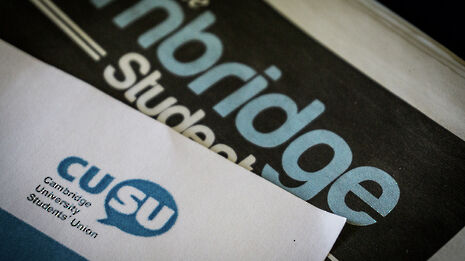New tensions over TCS as CUSU claims paper is facing ‘significant’ losses
The student union newspaper’s directors have spoken of their surprise at what they label “regrettable inaccuracies” in a new CUSU budget document

Tensions between CUSU and student union paper The Cambridge Student (TCS) risk flaring again, after the newspaper’s directors disputed what they called “regrettable inaccuracies” in a new CUSU budgeting document.
Ahead of CUSU Council this Monday, the student union released a briefing document for a ‘Mid-Year Budget Review’, which it says will “increase student awareness of CUSU’s financial performance” in advance of its annual budget presentation, in Easter term.
The document outlines CUSU’s expenditure for the year so far in broad strokes. The student union was anticipated to lose £75,000 this year, after budgeting for a loss following a collapse in its income triggered by a lapsed publishing contract. The new document predicts that losses this year may be slightly smaller than expected.
It says: “Print continues to perform far below that expected with a significant loss in revenue from TCS expected for the end of the year.”
The paper’s board of directors, comprising student volunteers who look over its operations, rebutted CUSU’s claims on Saturday, saying the student union had offered an incorrect portrayal of TCS’s finances.
In a statement, they said: “TCS were surprised to find our financial situation discussed in the mid year financial budget review. We have subsequently contacted the CUSU president about what we perceive to be regrettable inaccuracies, and have been promised a swift reply. At this point we will not comment again until after CUSU Council.”
Responding on Sunday, CUSU president Daisy Eyre said: “We have replied to TCS’ query, and have confirmed to them that the document accompanying the Mid-Year budget review is accurate. We would also like to make it clear that we have no plans to change TCS’ funding.
“In terms of the overall budget review, I am pleased to say that we are performing better than expected. Further, we hope that by holding a Mid-Year Budget Review, students will feel more involved with CUSU's finances and better able to understand the broader picture.”
TCS is funded entirely by CUSU, at a current cost of £7,000 a year. It is budgeted to bring in £12,180 in advertising revenue, but in recent years it has struggled to hit income targets. CUSU’s new document sounds a further warning over its profits.
Got a story for us?
Seen something you think Varsity should be talking about? Contact our News team at news@varsity.co.uk.
Any future debate about the paper’s print viability could reignite controversy from 2016, when CUSU Council voted to end the paper’s print run, consigning it to an online-only existence. The decision was marked by acrimony: CUSU said that the paper was no longer viable due to falling advertising income, but a group of TCS’s editors said that the student union’s business team had failed to properly manage it, allowing its revenues to collapse.
After heated debate at an extended Council meeting, and two deadlocked votes, Council narrowly voted in Easter Term 2016 to pass a budget which significantly cut TCS’s finances, with the intention of defunding its print edition.
In Michaelmas Term that year, former CUSU president Amatey Doku struck a deal with the paper’s new editors, agreeing to allow them to produce a fortnightly edition of the paper with a substantially reduced print run.
Eyre said in November that the student union would cut services, rather than staffing, if financial problems continued. As the student union grapples with its funding shortfall, the paper remains a potential target for further cuts.
Plans for Monday’s CUSU Council are also outlined in the document. Several decisions are to be brought to Council, including the ratification of a proposal by the CUSU Board of Trustees that no changes to be made to the existing 2017/18 budget allocations – “on the basis that, whilst finances for the year-to-date indicate that a positive variance against budget should be expected by end of year, CUSU is still operating a loss-making budget.”
The document notes that accounts running from July to December show the Union running £13,000 over budget, excluding “outstanding funds due to be transferred from the University”, with which it would show a positive variance of about £31,000. CUSU’s “cautious estimate” projects it running a smaller loss than previously expected.
In an attempt to address its funding crisis, having run at a loss since the 2014-2015 academic year, CUSU has launched a “new, replacement careers initiative” to fill the space left by its previous publishing deal, which went sour. While the document notes that “the initiative underperformed financially in its first year,” it claims that “feedback was positive and presents optimism going into future.”
In November, CUSU asked the University for “a net uplift of £80k per year,” which is being considered as part of the University’s Planning Round, in which central funding is allocated. They say that their plans had been “commended and supported by the [University] Council Committee for the Supervision of Students’ Unions (CCSSU)” – two years ago, a CUSU funding application was rejected for being too vague.
It is also expected that a new College-wide levy system – to replace the current CUSU affiliation fee, under which disaffiliated colleges do not pay – will raise revenues, with a resolution likely to be reached at some point this term. After years of campaigning on the issue, central University bodies began to show support last year after CUSU and the Graduate Union proposed the funding go directly to the Students’ Unions’ Advice Service.
The document claims that WomCam has already spent £1,300 of its £2,000 annual budget, despite being only a third of the way through the year. This would have made it the only Liberation Campaign spending ahead of its allocation. However, when contacted for comment, women’s officer Lola Olufemi wrote that “there is no set protocol or rhythm to how students from year-to-year spend their campaign budgets,” and “should not infer mis-management.”
Moreover, Olufemi found discrepancies in the published data. “As it happens,” she said, “enquiry into the figures has rooted out a rogue mis-posting to one of WomCam’s budget codes: £635.59 of condoms expense has been allocated as WomCam expenditure incorrectly; and so WomCam is ‘ahead’ of the year-to-date budget by £1.24 instead of £633.”
Correction 11:32 am: A previous version of this article incorrectly stated two motions for Monday’s Council, which were actually from an earlier session. This has been amended.
Update 2:06 pm: This article has been updated to include a statement from CUSU’s president, Daisy Eyre.
 News / Colleges charge different rents for the same Castle Street accommodation2 March 2026
News / Colleges charge different rents for the same Castle Street accommodation2 March 2026 News / King’s hosts open iftar for Ramadan3 March 2026
News / King’s hosts open iftar for Ramadan3 March 2026 Theatre / Lunatics and leisure centres 4 March 2026
Theatre / Lunatics and leisure centres 4 March 2026 News / Angela Merkel among Cambridge honorary degree nominees27 February 2026
News / Angela Merkel among Cambridge honorary degree nominees27 February 2026 News / News in Brief: waterworks, wine woes, and workplace wins 1 March 2026
News / News in Brief: waterworks, wine woes, and workplace wins 1 March 2026









